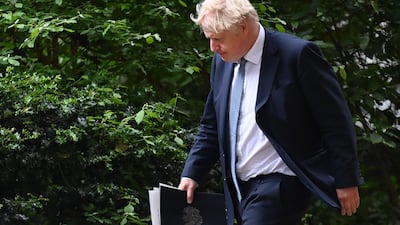In the days leading up to the national holiday for the platinum jubilee of Queen Elizabeth II, Boris Johnson has been caught out by a gathering storm of his own Conservative MPs signing up for a leadership contest against her majesty's first minister.
Doubts over the Conservative leader's position were triggered by sordid revelations around “Party Gate” last week and are being compounded by the pressures of a vicious cost-of-living crisis.
John Stevenson, the MP for Carlisle, became on Tuesday the latest Conservative backbencher to submit a letter calling for a vote of no confidence in Boris Johnson. The announcement follows three similar declarations on Monday, including a centrist former attorney general, Jeremy Wright, and a hardline Brexiteer, Andrew Bridgen. Close followers of the party have confirmed 28 MPs have asked for a vote, more than halfway to the threshold of 54.
Mr Stevenson said he had recently called on Mr Johnson to put himself forward for a confidence vote to “draw a line” under recent controversies but that the issue continued to fester. “The only option is for the Conservative MPs to facilitate a vote of confidence,” he said. “I have already take the appropriate action.”
Many Conservatives fear the loss of authority may already be terminal for the man who won a thumping general election victory in late 2019. “I do think we need firm leadership, a firmer leadership now,” said Andrea Thorpe, chairman of Maidstone and the Weald Conservative Association. “There’s more to it than party gate now, it’s the cost of living, it’s the fact that we’ve still got the National Insurance rise, we’ve still got VAT on fuel. All of these, these aren’t Conservative values and we’re not getting lower taxes … the police aren’t working, the NHS isn’t working and I think that’s the general feeling I’m getting.”

Former foreign secretary Lord Hague of Richmond said the prime minister is “in real trouble” and that Tory MPs are “moving towards having a ballot” on his leadership.
Allies of Mr Johnson had been hopeful he had escaped unscathed following a relatively muted initial response to Ms Gray’s report last week, but Lord Hague said it is proving to be “one of those sort of slow-fuse explosions in politics”.
“A lot of people misread it really, the events of last week as meaning the trouble is over, Boris is free and that’s actually not the mood in the Conservative Party, which is very, very troubled about the contents of that report,” he said. “So I think the Conservative Party will need to resolve this one way or another, obviously because to be an effective party they either need to rally behind the prime minister they’ve got, or they need to decide to force him out.
“I think they’re moving towards either next week or around the end of June, they are moving towards having a ballot, it looks like that.”
A steady stream of backbenchers have called on Mr Johnson to go after Ms Gray’s report laid bare a hard-drinking culture at the heart of government while raising renewed claims he misled parliament. Political veterans believe the premiership is now up for grabs.
“There is a real jitteriness around the parliamentary party of following a prime minister who isn’t really setting out a clear plan on necessarily where he wants to lead the country,” said Justine Greening, a former education secretary who stood down from parliament when Mr Johnson took over. “The reality is all prime ministers either have to get a grip or get out. That is a political rule that even Boris Johnson will need to follow.”

Sir Graham Brady, the chairman of the backbench 1922 Committee, must call a vote of confidence in Mr Johnson’s leadership if 54 Tory MPs — 15 per cent of the parliamentary party — submit a letter calling for one. Not all of those calling on Mr Johnson to go have said whether they have written to Sir Graham.
However, it is also widely believed in Westminster that a number of others have put in letters without declaring their intentions amid speculation the tally is approaching the total needed to trigger a vote.


